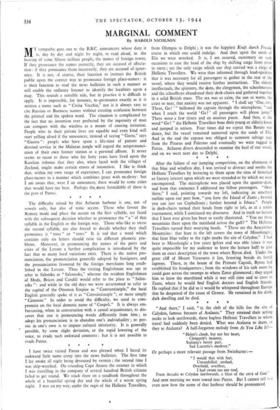The difficulty raised by this Achaean harbour is one, not
of vowels only, but also of tonic accent. Those who favour the Romaic mode and place the accent on the first syllable, are faced with the subsequent decision whether to pronounce the " a " of that syllable in the English or the foreign way. Those who like to stress the second syllable, are also forced to decide whether they shall pronounce it " trass " or " trars." It is sad that a word which contains only six letters should raise six different phonetic pro- blems. Moreover, in pronouncing the names of the ports and cities of the Levant a further complication is introduced by the fact that so many local variations exist. There is the native pro- nunciation, the pronunciation generally adopted by foreigners, and the pronunciation favoured by the foreign merchants long estab- lished in the Levant. Thus the visiting Englishman was apt to refer to Salonika as " Saloneeka," whereas the resident Englishmen of Moda, Beicos and Candili would refer to the place as " Salon- nika ": and while in the old days we were accustomed to refer to the capital of the Ottoman Empire as " Constantinople," the local English generally spoke of it as " Constantinople "; or more simply Constant." In order to avoid the difficulty, we used to com- promise on the local demotic name of "Cospoli." It is always em- barrassing, when in conversation with a casual acquaintance, to dis- cover that one is pronouncing words differently from him ; to adopt his pronunciation is to abandon one's individuality ; to per- sist in one's own is to impute cultural inferiority. It is generally possible, by some slight deviation, or the rapid lowering of the voice, to evade such awkward contrasts: but it is not possible to evade Patras. *


























 Previous page
Previous page